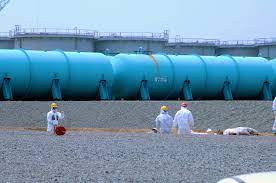IAEA Confirms Safety of 15th Discharge of ALPS-Treated Water at Fukushima
The latest confirmation follows the IAEA’s landmark safety review issued on 4 July 2023, prior to the start of the discharge process.

The International Atomic Energy Agency (IAEA) has reaffirmed the safety of Japan’s controlled release of treated water from the Fukushima Daiichi Nuclear Power Station (FDNPS). Independent sampling and analysis carried out by the IAEA confirmed that tritium concentrations in the 15th batch of Advanced Liquid Processing System (ALPS)-treated water, discharged today by the Tokyo Electric Power Company (TEPCO), remain far below Japan’s operational safety limit and in full compliance with international standards.
Confirming Safety Standards Through Independent Sampling
As part of its continuous oversight mission, the IAEA collected onsite samples of the diluted water prior to its release. The analysis showed tritium levels significantly lower than the operational limit of 1,500 becquerels per litre. These results provide further evidence that the discharge process is being conducted safely, under strict monitoring and in accordance with both Japanese regulations and global safety standards.
“The findings confirm what has been observed since the first release in August 2023 — that the treated and diluted water meets safety criteria and poses negligible risk to human health or the environment,” the IAEA noted.
Long-Term Discharge Process Underway
Japan began the carefully managed release of ALPS-treated water in August 2023. The plan involves discharging the stored water gradually over several decades, ensuring that safety measures remain robust and transparent throughout. Before each release, the water is diluted with seawater to further reduce tritium concentrations.
To date, approximately 109,000 cubic meters of water have been discharged across the first 14 batches. Each release has been independently reviewed and verified by the IAEA, reinforcing confidence in the transparency and safety of the programme.
Backed by a Comprehensive Safety Review
The latest confirmation follows the IAEA’s landmark safety review issued on 4 July 2023, prior to the start of the discharge process. That review concluded that Japan’s approach was consistent with international safety standards and that the release would have a negligible radiological impact on people and the environment.
The IAEA has since maintained a permanent presence in Japan to monitor, sample, and assess each stage of the release process. This ensures that data and results are available to the international community, helping address concerns about the environmental and health impacts of the project.
Transparency and International Oversight
Global scrutiny of Japan’s decision to discharge treated water from Fukushima has been intense, with neighbouring countries and environmental groups raising questions about long-term impacts. By inviting the IAEA to provide independent verification, Japan has sought to demonstrate transparency and compliance with international norms.
The IAEA’s confirmation that the tritium concentrations in this 15th batch are well below limits strengthens assurances that the programme is being carried out responsibly. It also highlights the role of international cooperation in maintaining trust and accountability in nuclear safety matters.
Looking Ahead
With decades of gradual releases still ahead, the IAEA will continue its monitoring programme, ensuring that all discharges remain safe and that the public and international community are regularly informed. The agency has committed to publishing its findings openly, reinforcing its role as an impartial guarantor of nuclear safety.
For Japan, today’s confirmation represents another step in the long recovery from the Fukushima nuclear accident of 2011. While challenges remain, the safe management of ALPS-treated water underscores the progress being made in balancing environmental protection, public health, and the technical realities of decommissioning the nuclear site.










